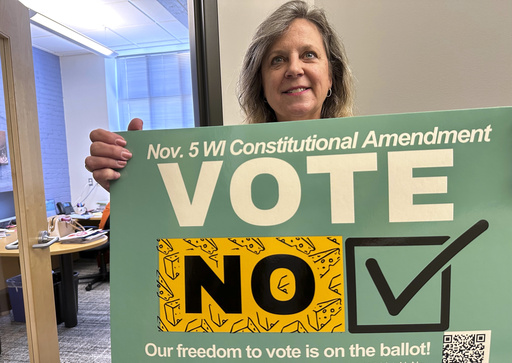
MADISON, Wis. — Voters in Wisconsin are set to influence the political dynamics of the Legislature in the upcoming elections, which will take place on Tuesday. They will also have the opportunity to decide on a proposed constitutional amendment aimed at prohibiting foreign nationals from voting in the state.
This election is pivotal for the Wisconsin Legislature, where Republicans have maintained control since 2010. That year, they captured both the Assembly and the Senate, subsequently redistricting to strengthen their hold on power. For the past 13 years, they have successfully held majorities in both chambers.
However, a significant shift occurred in the political arena last year when liberal justices gained control of the state Supreme Court, leading to the invalidation of Republican-drawn district maps. This change has enabled Democratic Governor Tony Evers to redraw district lines, creating optimism for a more competitive election with potential gains for the Democratic Party across both legislative chambers.
Currently, Republicans dominate the Assembly with a 64-35 majority, but due to redistricting and retirements, there are 57 open seats and 15 Democratic candidates running unopposed. Democratic leaders believe this presents a viable opportunity to reclaim control of the Assembly. However, Assembly Speaker Robin Vos has suggested that the likelihood of significant Democratic gains is minimal, pointing out the party’s historical struggles to secure a majority in recent years.
In contrast, Democrats face a steeper challenge in the Senate, where Republicans hold a 22-11 majority. This cycle, ten Republican and six Democratic seats are contested. To achieve a majority of 17 seats, Democrats would need to secure 12 wins, including holding onto all six of their current seats while flipping at least six Republican-held seats—a formidable challenge given the current political climate and district configurations. Democratic leaders have indicated that these elections may primarily serve as a strategy to prepare for a more ambitious run in 2026.
As for the proposed citizenship amendment, the existing Wisconsin Constitution allows for voting by any U.S. citizen. The Republican-backed amendment aims to explicitly reinforce that only U.S. citizens are permitted to vote in federal, state, and local elections within Wisconsin.
This initiative follows similar measures in other states, with six states already having adopted such language in their voting laws and seven additional states, including Wisconsin, featuring it on their ballots during this election cycle. The push for these amendments reflects a broader national movement among Republicans, particularly in response to instances in the District of Columbia and several municipalities in states like California, Maryland, and Vermont, where noncitizens have been granted voting rights in local elections.

